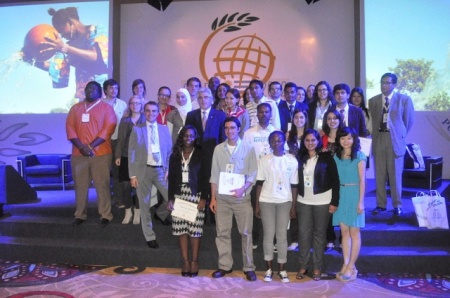 |
| Photo Credit: @Farming_bants |
World Food Day isn't about 1 day, 1 week or even 1 month, as events take place thru the year. Here's what's going on: http://t.co/KsAJFhFKWr
— World Food Day (@FAOWFD) October 31, 2013
In line with the 2013 theme on Sustainable Food Systems for Food Security and Nutrition, European Twitter chat groups led by @agrichatUK brought together farmers from all over the world in a closely coordinated twitter chat to discuss and share their experiences as pertains their producing food for the global population. The event attracted participants from USA, UK, Netherland, Australia, Kenya, Canada and EU culminating to a total of 3664 tweets,890,282reach from 632 contributors(Source:AgrichatUK) This was held under the guidance of six questions that follow thus:
- Q1a : Please introduce yourself by saying who you are,where you are from and what food you produce and share any farm pictures! #AgriChatWorld
- Q1b : Tell us about Agriculture in your country.What is your country famous for and what are you most proud of? #AgriChatWorld
- Q2 : What is the biggest challenge and/or opportunity facing you as a farmer in your country? #AgriChatWorld
- Q3 : As a farmer or consumer, do you feel the effects of globalisation? What are the local or global aspects of farming? #AgriChatWorld
- Q4 : How do you think farming and our food system will change in the future? #AgriChatWorld
- Q5 : Do you think farmers around the world can work together? If so, how and why? #AgriChatWorld
- Q6 : What would be your number 1 wish for the future of food and farming in the world?
Two questions grabbed my attention (question 2 and 6) as they provided insight on whats happening in the field of farming globally and presented an uniform view around the same.Some of the challenges farmers face turned to be similar and at the same, some challenges presented an opportunity in themselves.As reported during the chat,these challenges included:
*Tuberculosis
*Lack of local slaughter facilities. Can't get sheep processed in time
*One of our biggest challenges in many parts of the USA is water issues (too much or too little)
*High land prices and slipper farming (claiming subsidy but not actively farming)
*Biggest challenge for NZ is market access and dispelling the myth of the footprint
* Large problem is having all sectors constantly placed in competition with each other.Need to begin to work together more
*Biggest challenge in my mind is educating the public about where their food comes from, it's scary how many have no idea
*Biggest challenge is competition for land
*Problems? Changing, extreme weather and constantly evolving rules probably top of the list.
*Maintaining a diverse, sustainable agricultural base in face of mono-culture commodity farming has to be common challenge
* Biggest challenge is to feed the world using sustainable production methods
(Find a continuation of the challenge/opportunity tweets HERE)
The other question looked at the future of farming where participants expressed their wish for agriculture.These included;
*To preserve the earth we have and still feed the mouths that need to be fed.
*That everyone would have enough nutritious food to eat while preserving a sustainable world
*More small farms = more farmers = system for food resilience
*Top quality food at a fair price for consumer, producer and farmer
*I wish we could all be #Agvocates and tell our story to all!
*That people would appreciate the real value of food. If we do that everybody including the environment will benefit.
*My one wish would be reduced food waste - so much work goes into its production - more respect for food and farming
*Healthy farms, healthy environment, healthy farmers
*That I leave my soil for the next generation capable of sustainable production
*That we could manage as farmers to feed the already 842 million people going hungry globally
*I wish the weather could learn to behave itself & do as its told.
*That we pull off the miracle of feeding everyone over the next 40 years. I really hope we make it.
*That farmers got the respect they deserve & bad farmers disappear
* Profitably produce highly nutritious food at a level that is globally abundant and affordable
*That I leave my soil for the next generation capable of sustainable production
*Sorry I've got 3: educated buyers, sustainable farming systems, closer farming community
*My #1 wish is for consumers to learn everything about where how their #steak and other food gets to their plates
* That everyone is educated on the power of ag & the necessity to support our farmers in sustaining our world
( Find the whole set of the wishes from farmers HERE )
Farming is the big thing almost happening. What is your one wish for the same?What challenges do you face as a farmer? And its my hope that as we set on the path of producing food for millions of people, Chief Seattle words will constantly echo in our minds ; that we do not inherit the earth from our ancestors but rather we borrow it from our children.




